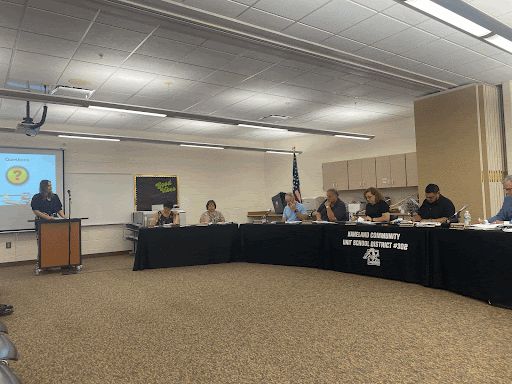With Kaneland High School’s standards-based grading system (SBG) going away after the recent directive from the school board to sunset the policy, it is important that the student perspective is considered. Students in each grade level at KHS have gone through different versions of SBG over the past few years. No grade level has had the same high school experience because of the frequent SBG policy revisions that have taken place. As the grading policy we have come to know changes at the beginning of the 2024-25 school year, it will affect each grade level differently.
The student body seems to agree with the board’s decision to remove SBG. Based on the findings of a voluntary survey that 174 Kaneland students of all grade levels took, 79.9% prefer traditional grading over SBG.
A big difference between SBG and traditional grading is that SBG uses a four-point scale to indicate how students are performing in the class. It does not use percentages that easily convert to letter grades as one would expect in a more traditional setting. Because SBG is not very compatible with letter grades, it has also been challenging for both teachers and students to convert scores from the SBG model into letter grades that will shape each student’s grade point average (GPA). Transcripts for the high school are made using letter grades and the resulting GPA. With the four-point scale, it has been difficult for students to know where they fall on the letter system depending on their mix of scores in the gradebooks for each of their classes.
Freshman Colette Brophy said, “I personally get really upset when I don’t get a four. I’m okay with a B, but having a three feels so much worse than a four and makes me feel like I’m getting a C instead because converting it to a letter grade is so confusing.”
Not only did students think it was confusing, but senior Lizzie Duncan noticed that there were also inconsistencies in what defined a four from one class to another.
“It’s harder to learn with SBG because how are students supposed to learn the difference between a three and a four?” Duncan asked. “A four is considered above and beyond in one class, but it is just [meeting the expectations] in another class.”
Despite the confusion that can accompany any grading system, there have been some positive aspects of SBG. It allows students to slow down and take a unit one standard at a time. They do not have to divide their attention between a variety of topics at the same time within a single class, which helps students know what skills they should focus on to improve their grades.
“SBG feels more simplified in terms of what I need to do to get an A. It explains what I’m struggling with compared with what I’m good at,” sophomore Daniel Somerlot said.
Although students should have a clearer sense of what to improve upon when they are graded using standards, it can be hard for students to know their overall grade in a class throughout the year. This can lead to potential surprises at the end of a grading period, when students often have to calculate their overall grades themselves.
“It got really confusing,” freshman Zackary Eadens said. “Especially with calculating your [letter grade], it was really hard to figure out.”
Even students who have been a part of the SBG shift for most of their high school careers can find it confusing.
“It was a big change, but I think that with SBG, what people have an issue with is the conversion chart, not the grading itself,” senior Nicklas Stefanik said.
Because the shift from traditional grading to the standards-based approach was so new to the district when it first started, each year has brought at least some changes as staff members have worked to refine their grading practices.
“It’s never been consistent,” junior Megan Johnson said. “Every year, something changes and some expectations are way different.”
To start the 2022-23 school year, KHS introduced the student responsibility standard. Unlike traditional grading, SBG was not intended to include formative work such as homework, in-class practice or participation as a part of a student’s overall grade. With the transition to SBG, then, many students started to view homework as unnecessary if there would be no direct connection to their overall grade in a class. The student responsibility standard was put in place to combat that mentality and to try to reassert the value of work completion. That standard evaluates a student based on their participation in class as well as their homework completion.
“I understand why we have the student responsibility grade,” sophomore Peyton Hayward said. “It is important that there is some kind of work being done outside of school, but it’s still unfair. Not everybody has time to get everything done.”
Because there was no way to give the responsibility standard less weight than any other standard in a class, it gave students additional pressure that was supposed to be taken away with SBG.
“The student responsibility grade just added back on the stress and expectations of homework,” Johnson said.
Teaching students to be responsible throughout their high school career is obviously important. Students should know that they are being held accountable for their work, just like in a job or higher education setting. But that does not mean the responsibility standard was perfect, according to some students.
“I think it’s good in concept, but it’s kind of easy to abuse,” junior Winona Phillips said. “You can do all of your work at the end of the semester and be fine. It doesn’t accurately represent your responsibility.”
As Kaneland transitions back to a more traditional approach to grading next year, it is to this point unclear what the revised system will look like. More information will be coming from board meetings throughout next semester. For now, though, students can only wait to hear what will happen in their classes next year. One component of SBG that students seem to hope remains in whatever form the new system takes is the ability to reassess.
“I like the reassessment factor of SBG, so having the traditional percentage with that capability would be nice,” Phillips said.
Stefanik prefers SBG as a grading practice and believes that this upcoming change will not be as beneficial as most students seem to assume.
“People don’t know what they are in for next year,” Stefanik said. “They’re going to think it’ll be easier, but I’m not certain it will be easier for the students.”
Some seniors who will not experience the grading policy change next year feel annoyed about the switch. Duncan, for example, has expressed that they feel they were the “guinea pigs” of SBG at Kaneland. While it may not directly affect them next year once they have graduated, this year’s seniors still have thoughts about the shift from SBG.
“My grade at least got put into SBG right at the start of freshman year,” Duncan said. “Most classes were [using] it by then. We’ve been dealing with it for so long and the year we graduate, it’s gone. It’s very irritating.”
The thought of something new can cause some anxiety coming into the new school year. For most students who will be in attendance at KHS next year, the uncertainty is mixed with at least some degree of excitement.
Sophomore Aaron Petersen said, “I hope they keep the way they grade, except for the responsibility grade. But they should change the scale of 1 through 4 to normal letter grades.”
District Director of Educational Services 6-12 Patrick Raleigh has been through many stages of meetings trying to ensure a smooth transition into the next academic year. His hope is to present a plan to the board in April.










